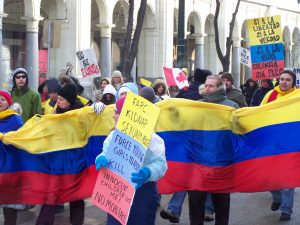 Colombian President Juan Manuel Santos stated on January 15th at the annual meeting of the World Economic Forum in Davos, Switzerland, that there has been progress in peace negotiations between the Colombian government and Colombia’s second largest and oldest guerrilla group, the National Liberation Army (ELN). The ELN, born in 1965 as an anti-imperialist political project was inspired by the Cuban Revolution. It currently has in its ranks some 1,500 insurgent fighters and according to Colombian military sources they are characterized to have a strong influence in Arauca, North of Santander, Nariño, Casanare, Boyacá, South of Bolívar, Chocó and Cauca.3 These regions especially and the entire country will be affected by the second phase of talks between the Colombian government and the ELN.
Colombian President Juan Manuel Santos stated on January 15th at the annual meeting of the World Economic Forum in Davos, Switzerland, that there has been progress in peace negotiations between the Colombian government and Colombia’s second largest and oldest guerrilla group, the National Liberation Army (ELN). The ELN, born in 1965 as an anti-imperialist political project was inspired by the Cuban Revolution. It currently has in its ranks some 1,500 insurgent fighters and according to Colombian military sources they are characterized to have a strong influence in Arauca, North of Santander, Nariño, Casanare, Boyacá, South of Bolívar, Chocó and Cauca.3 These regions especially and the entire country will be affected by the second phase of talks between the Colombian government and the ELN.
The first phase of talks has been characterized to have been private and informal and began more than three years ago. This exploratory process hit a breakthrough in late March of last year with an agreement from both sides to proceed with formal, public negotiations and a six point agenda was introduced to educate the public on this new initiative.
At that time, the president stated that after months of preliminary and discrete negotiations, a framework agreement had already been signed to begin the public phase of the negotiations and that these would be in Ecuador. On October 10, just days after his defeat in the peace referendum with the FARC (Revolutionary Armed Forces of Colombia) Santos specified that the public phase of negotiations with the ELN would begin on October 27 in Quito. The negotiating teams were clearly outlined as well and things were looking very positive.
Unfortunately, the start of the talks was postponed because the ELN did not follow through on a vital part of the government’s specific demands: the relsease from captivity of Odín Sánchez Montes de Oca, a politician from the department of Chocó, who has been captive since April 2016. Since he was not released, negotiations were suspended until January 18th, when after six days of negotiations in Ecuador, the ELN and the Colombian government released a new negotiation for the ex-congressman Odín Sánchez to be released on February 2nd along with other ELN petitions of member incarcerations.
Official peace talks are stated to begin on February 7th and in their statement the Colombian government especially thanked the Ecuadorean government for “the generous hospitality that it has been giving in its territory for the development of these conversations.” The other guaranteeing delegates countries will be Venezuela, Norway, Cuba, Chile and Brazil. Hopefully the time has come for both parties follow through and make concrete steps towards peace.
It is interesting to note that the Archbishop of Cali, Monsignor Dario Monsalve, who has been a facilitator with the ELN, was said to be in charge of reminding this guerrilla group that they must consider how the international context is changing and that it is not advisable to delay their participation in negotiations towards peace. The end of the government of Rafael Correa in Ecuador, who has facilitated the space for peace negotiations up till the present day, the precarious political situation of Nicolas Maduro in Venezuela, where one of the rounds of negotiation will inevitably take pace along with the inauguration of Donald Trump to the presidency of the United States as just three of the facts that should be considered in the notion that this matter be solved quickly.
With the beginning of these talks, and after the agreement with the FARC, Colombia will move towards a more complete peace. “The processes may be different but the end of the day the conflict is one” president Juan Manuel Santos has repeatedly stated on several occasions.
Daniel García Peña, a professor at the National University and ex-peace commissioner, is optimistic about the announcement and thinks it “a very significant advance”. He also highlights the particularities of this negotiation explaining that “the delays have been characteristic of a process that is different from the FARC, whose central axis will be the participation of society, a complex but very necessary issue for the moment the country is living.” As Pablo Beltrán, ELN’s chief negotiator, noted in excitement to the news “it allows us to start implementing the agenda of six points, whose sole purpose is to overcome the armed conflict.” Beltran called for popular participation, which is at the heart of the agenda presented last March.10
The points in the Agenda of negotiations of peace between the Government of Colombia and ELN include: Participation of the society in the construction of peace, Democracy for the peace, Transformations for the peace. The Victims, the End of the Armed Conflict, the Implementation of the Agreements. It will be interesting to see just how these six points are implemented into a second peace treaty to complete this peace process for the Colombian people.
Photo: “Walk for the Peace of Colombia” (February 4, 2008). Robert Thivierge. Retrieved from https://www.flickr.com/photos
About the author: Sayumi Teshima is a recently U of T alumni, who completed her degree in Spanish, Latin American Studies and Buddhist Psychology and Mental Health. She grew up in Toronto and is of both Colombian and Japanese heritage. Sayumi has a passion for human rights, and takes an interest in social service provision.